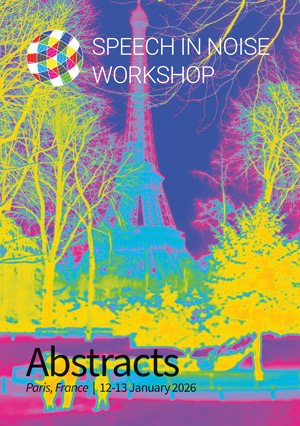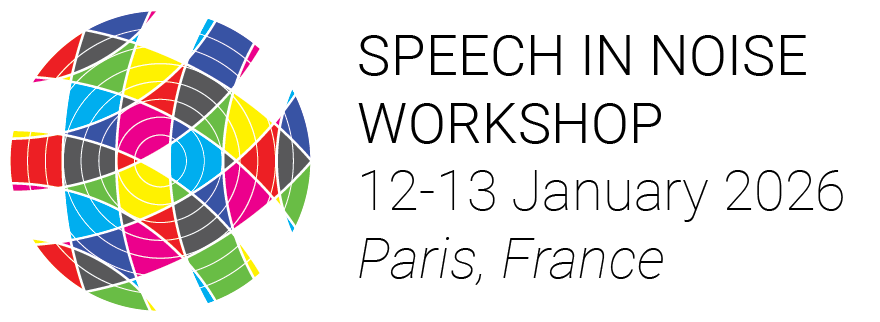Programme
 |
The abstract booklet can be downloaded here, or from Zenodo: doi:10.5281/zenodo.18255913. |
| Monday 12 January 2026 | ||
|---|---|---|
| 09:00 | 10:00 | Registration & Coffee |
| 10:00 | 10:10 | Opening remarks |
| 10:10 | 10:35 | How do visual mechanisms help auditory-only speech and speaker recognition? Abstract Dresden University of Technology, Germany |
| 10:35 | 11:00 | How voice familiarity affects speech-in-speech perception Abstract University College London, UK |
| 11:00 | 11:25 | Miscommunications in triadic conversations: Effects of hearing loss, hearing aids, and background noise Abstract ORCA Labs, Scientific Institute of WS Audiology, Lynge, Denmark |
| 11:25 | 11:50 | Coffee, Photo |
| 11:50 | 12:15 | The microscopic impact of noise on phoneme perception and some implications for the nature of phonetic cues Abstract Laboratoire des systèmes perceptifs, Département d’études cognitives, École normale supérieure, PSL University, CNRS, 75005 Paris, France |
| 12:15 | 12:40 | Adaptation to noise: A minireview of mechanisms and individual factors Abstract University of Salamanca, Spain |
| 12:40 | 14:00 | Lunch |
| 14:00 | 15:00 | KeynoteExamination of speech coding in the human auditory nerve using intracranial recordings Abstract Institut Otoneurochirurgical de Champagne Ardenne, CHU de Reims, France | Institut des Neurosciences de Montpellier, France |
| 15:00 | 17:30 | Poster session 1 — with coffee |
| 17:30 | 19:00 | Free time |
| 19:00 | 22:00 | Conference dinner at La Mère Catherine, 6 Place du Tertre, 75018 Paris |
| Tuesday 13 January 2026 | ||
| 09:00 | 10:00 | Coffee |
| 10:00 | 10:25 | Voice cue sensitivity and speech perception in speech maskers in children with hearing aids Abstract University of Groningen / University Medical Center Groningen, Netherlands |
| 10:25 | 10:50 | Cochlear implantation in children with single sided deafness Abstract Experimental ORL, Dept Neurosciences, KU Leuven, Belgium |
| 10:50 | 11:10 | Modelling the contributions of auditory, speech, language, and cognitive processes to speech-in-noise perception in school-aged children: A structural equation approach Abstract The University of Manchester, UK |
| 11:10 | 11:50 | Coffee |
| 11:50 | 12:15 | What does cognitive listening mean? Is it time for a rethink? Abstract University of York, UK |
| 12:15 | 12:40 | Colin Cherry Award 2025Age-related changes in alpha activity during dual-task speech perception and balance Abstract Lancaster University, Lancaster, UK |
| 12:40 | 14:00 | Lunch |
| 14:00 | 16:30 | Poster session 2 — with coffee |
| 16:30 | 17:00 | Business meeting: Colin Cherry Award 2026, next SPIN meeting and closing remarks. Open to everyone, please attend! |
| 17:30 | ... | Evening drinks at La Roue Libre, 80 Boulevard Richard-Lenoir, 75011 Paris |
Posters
Session 1: Monday 12 January 2026, 15:00-17:30
| P01 | |
| P03 | |
| P05 | |
| P07 | |
| P09 | |
| P11 | |
| P13 | |
| P15 | |
| P17 | |
| P19 | |
| P21 | |
| P23 | |
| P25 | |
| P27 | |
| P29 | |
| P31 | |
| P33 | |
| P35 | |
| P37 | |
| P39 | |
| P41 | |
| P43 | |
| P45 | |
| P47 | |
| P49 | |
| P51 | |
| P53 | |
| P55 | |
| P57 | |
| P59 | |
| P61 | |
| P63 | |
| P65 | |
| P67 | |
| P69 | |
| P71 | |
| P73 | |
| P75 | |
| P77 |
| P02 | |
| P04 | |
| P06 | |
| P08 | |
| P10 | |
| P12 | |
| P14 | |
| P16 | |
| P18 | |
| P20 | |
| P22 | |
| P24 | |
| P26 | |
| P28 | |
| P30 | |
| P32 | |
| P34 | |
| P36 | |
| P38 | |
| P40 | |
| P42 | |
| P44 | |
| P46 | |
| P48 | |
| P50 | |
| P52 | |
| P54 | |
| P56 | |
| P58 | |
| P60 | |
| P62 | |
| P64 | |
| P66 | |
| P68 | |
| P70 | |
| P72 | |
| P74 | |
| P76 | |
| P78 |

